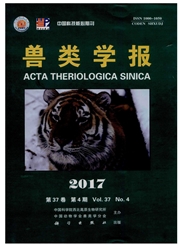

 中文摘要:
中文摘要:
为研究建巢行为对室内繁育根田鼠的可能影响,共设计两个实验:(1)选择30对配对根田鼠分成两组,即15对建巢根田鼠(建巢组)和15对不建巢根田鼠(不建巢组),每对根田鼠提供5.3g左右的棉花作巢材,持续30d。记录两组有无实验动物时的巢内、巢上温度变化情况。(2)记录24窝后代的出生时体重、断奶时体重、杀婴的数量和日龄。结果表明,建巢组巢内温度显著高于不建巢组巢内温度,相反的是,建巢组的巢上温度比不建巢组的巢上温度低。两组间后代出生时的平均体重没有显著差异但断奶时的体重存在显著差异。而且,在2~14日龄间,建巢组和不建巢组雄性后代体重之间存在显著差异。建巢组的杀婴数量极显著低于不建巢组的杀婴数量。因此,建巢行为可以显著提高雄性后代的个体发育和后代的存活。
 英文摘要:
英文摘要:
Wild root voles(Microtus oeconomus) make nests in the field because of the cold winters and the low temperatures in summer nights. When bred in laboratory,most of them continue to make nests. Nevertheless,some root voles do not make nests anymore. To test the hypothesis that nest-building is an important thermoregulatory behavior to promote the high fitness of the parents even in the normal temperature conditions (at 22±2℃),two experiments were conducted. Part Ⅰ:Thirty mating pairs including fifteen nest-building and fifteen non-nest-building,were provided with 5.3 g of cotton to build a nest,for a period of 30 days. The temperatures in nest-building and non-nest-building groups,in and above nest,with animals or without animals,and the changes of temperature during 60 min periods were investigated. Part Ⅱ:Twenty-four broods' were used in this experiment. The body weight on natal day and weaning day,and numbers and age in days of infanticides were recorded. The results showed the average temperature in the nest-building group was significantly higher than the non-nest-building group. On the contrary,average temperature above the nest of nest-building group was lower than for the non-nest-building group. Average body weight on natal day was not different between the nest-building group and the non-nest-building group but average body weight on weaning day was significantly different between the nest-building group and the non-nest-building group. There were significant differences in male offsprings' average body weight between the nest-building group and the non-nest-building group from 2 to 14 days of age. The results indicated that nest-building has significant influence on parents' fitness in root vole bred in laboratory.
 同期刊论文项目
同期刊论文项目
 同项目期刊论文
同项目期刊论文
 CHEMICAL COMMUNICATION IN MAMMAL POPULATION: URINARY OLFACTORY CHEMOSIGNALS IN LACTATING FEMALE ROOT
CHEMICAL COMMUNICATION IN MAMMAL POPULATION: URINARY OLFACTORY CHEMOSIGNALS IN LACTATING FEMALE ROOT OPPOSITE-SEX SIBLING RECOGNITION IN ADULT ROOT VOLE, MICROTUS OECONOMUS PALLAS: PHENOTYPE MATCHING O
OPPOSITE-SEX SIBLING RECOGNITION IN ADULT ROOT VOLE, MICROTUS OECONOMUS PALLAS: PHENOTYPE MATCHING O 期刊信息
期刊信息
